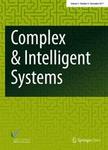版权所有:内蒙古大学图书馆 技术提供:维普资讯• 智图
内蒙古自治区呼和浩特市赛罕区大学西街235号 邮编: 010021

作者机构:Natl Univ Def Technol Lab big data & decis Changsha 410073 Peoples R China
出 版 物:《COMPLEX & INTELLIGENT SYSTEMS》 (Complex Intell. Syst.)
年 卷 期:2025年第11卷第2期
页 面:1-19页
核心收录:
基 金:National Natural Science Foundation of China
主 题:Coevolutionary algorithm Multi-objective combinatorial optimization Multi-objective immune algorithm Multi-UAV Task allocation problem
摘 要:With the development of Unmanned Aerial Vehicle (UAV) technology towards multi-UAV and UAV swarm, multi-UAV cooperative task allocation has more and more influence on the success or failure of UAV missions. From the operational research point of view, such problems belong to high-dimensional combinatorial optimization problems, which makes the solving process face many challenges. One is that the discrete and high-dimensional decision variables make the quality of the solution obtained with acceptable time not guaranteed. Second, the desired solution of real missions often needs to satisfy multiple objective functions, or a set of solutions for decision-making. Therefore, this paper constructs a Multi-objective Combinatorial Optimization in Multi-UAV Task Allocation Problem (MCOTAP) model, and proposes a Bi-subpopulation Coevolutionary Immune Algorithm (BCIA). The two coevolutionary mechanisms improve the lower limit of population diversity, and the evolutionary strategy pool integrating multiple strategies and the adaptive strategy selection mechanism enhance the local search ability in the late evolution. In the experiments, BCIA competes fairly with the mainstream multi-objective evolutionary algorithms (MOEAs), multi-objective immune algorithms (MOIAs) and the recently proposed multi-UAV mission planning algorithms. The experimental results on different test problems (including several multi-objective combinatorial optimization benchmark problems and the proposed MCOTAP model) show that BCIA has superior performance in solving multi-objective combinatorial optimization problems (MCOPs). At the same time, the effectiveness of each design component of BCIA has been comprehensively verified in the ablation study.